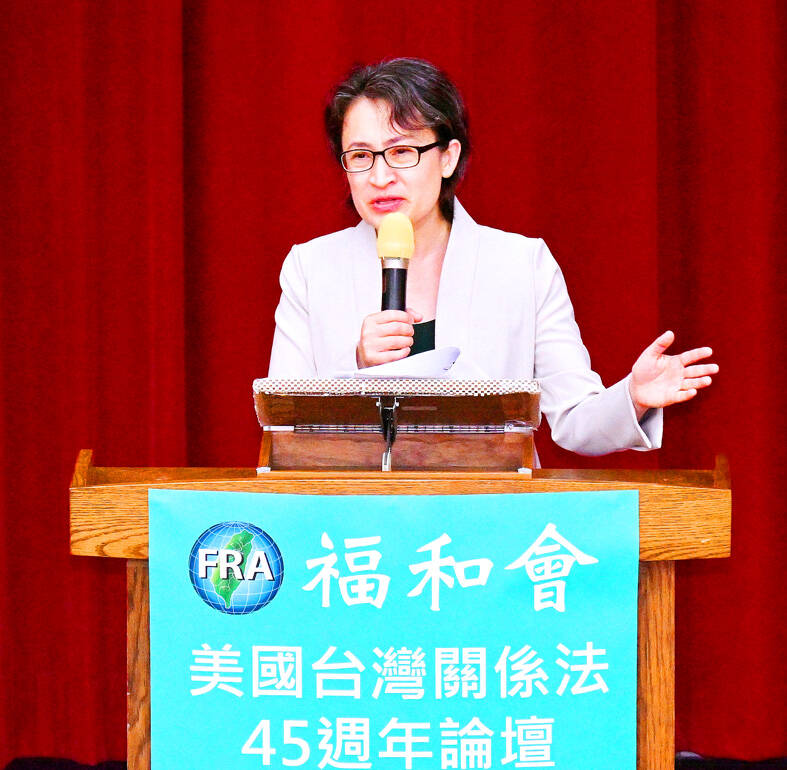Taiwanese need to demonstrate their resolve to defend freedom, democracy and the nation’s sovereignty, while increasing the defense budget and accelerating military reforms to garner more support internationally, vice president-elect Hsiao Bi-khim (蕭美琴) said yesterday.
Hsiao made the remarks in a speech at a forum in Taipei on the 45th anniversary of the US’ Taiwan Relations Act (TRA), which is a foundation for Washington’s policy toward Taipei in the absence of formal diplomatic ties.
Hsiao, who is to take office on May 20, reiterated president-elect William Lai’s (賴清德) commitment to his “four-pillar” plan to safeguard peace and stability in Taiwan, which underscores the importance of defense, economic security, partnerships with other democracies and a stable and consistent cross-strait policy.

Photo: Fang Pin-chao, Taipei Times
Under Lai’s leadership, Taiwan would continue to be a steady and responsible member of the Indo-Pacific region, she told the forum hosted by the Formosa Republican Association.
Over the past eight years, President Tsai Ing-wen’s (蔡英文) steady leadership has facilitated “a very smooth channel of communication” between Taiwan and the US and enabled a bilateral relationship built on “mutual trust” and “zero incidents,” Hsiao said.
Under Lai’s leadership, Taiwan would continue to be a “stable [and] responsible” member of the Indo-Pacific region and contribute to regional prosperity, Hsiao said, adding that this would be “key” to increasing goodwill between the two sides.
Relations between Taiwan and the US would continue to grow, despite both countries facing new global challenges, in particular Russia’s protracted war in Ukraine, the Israel-Hamas war and China’s destabilizing activities in the region, she said.
Hsiao said she anticipates more bilateral collaboration in the fields of education, technology and culture, and hopes the US Congress will expedite the legislative process to eliminate double taxation with Taiwan.
The TRA was passed by the US Congress after Washington switched diplomatic recognition from the Republic of China to the People’s Republic of China. It was signed into law by then-US president Jimmy Carter on April 10, 1979.
The act has served as a legal framework for Washington in guiding its unofficial relations with Taipei, including providing arms to meet its defensive needs.
Additional reporting by Chen Cheng-yu

STILL COMMITTED: The US opposes any forced change to the ‘status quo’ in the Strait, but also does not seek conflict, US Secretary of State Marco Rubio said US President Donald Trump’s administration released US$5.3 billion in previously frozen foreign aid, including US$870 million in security exemptions for programs in Taiwan, a list of exemptions reviewed by Reuters showed. Trump ordered a 90-day pause on foreign aid shortly after taking office on Jan. 20, halting funding for everything from programs that fight starvation and deadly diseases to providing shelters for millions of displaced people across the globe. US Secretary of State Marco Rubio, who has said that all foreign assistance must align with Trump’s “America First” priorities, issued waivers late last month on military aid to Israel and Egypt, the

‘UNITED FRONT’ FRONTS: Barring contact with Huaqiao and Jinan universities is needed to stop China targeting Taiwanese students, the education minister said Taiwan has blacklisted two Chinese universities from conducting academic exchange programs in the nation after reports that the institutes are arms of Beijing’s United Front Work Department, Minister of Education Cheng Ying-yao (鄭英耀) said in an exclusive interview with the Chinese-language Liberty Times (the Taipei Times’ sister paper) published yesterday. China’s Huaqiao University in Xiamen and Quanzhou, as well as Jinan University in Guangzhou, which have 600 and 1,500 Taiwanese on their rolls respectively, are under direct control of the Chinese government’s political warfare branch, Cheng said, citing reports by national security officials. A comprehensive ban on Taiwanese institutions collaborating or

France’s nuclear-powered aircraft carrier and accompanying warships were in the Philippines yesterday after holding combat drills with Philippine forces in the disputed South China Sea in a show of firepower that would likely antagonize China. The Charles de Gaulle on Friday docked at Subic Bay, a former US naval base northwest of Manila, for a break after more than two months of deployment in the Indo-Pacific region. The French carrier engaged with security allies for contingency readiness and to promote regional security, including with Philippine forces, navy ships and fighter jets. They held anti-submarine warfare drills and aerial combat training on Friday in

COMBAT READINESS: The military is reviewing weaponry, personnel resources, and mobilization and recovery forces to adjust defense strategies, the defense minister said The military has released a photograph of Minister of National Defense Wellington Koo (顧立雄) appearing to sit beside a US general during the annual Han Kuang military exercises on Friday last week in a historic first. In the photo, Koo, who was presiding over the drills with high-level officers, appears to be sitting next to US Marine Corps Major General Jay Bargeron, the director of strategic planning and policy of the US Indo-Pacific Command, although only Bargeron’s name tag is visible in the seat as “J5 Maj General.” It is the first time the military has released a photo of an active